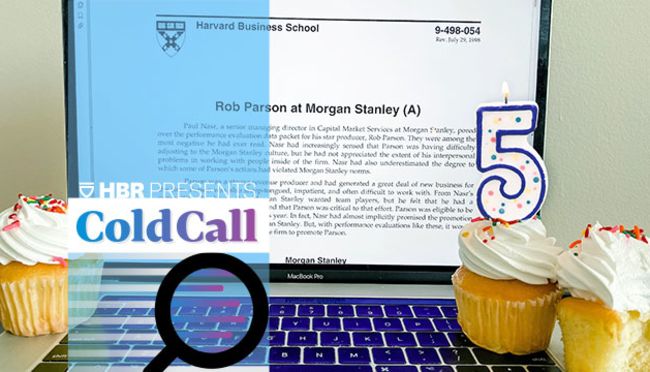Performance Evaluation →
→

- 23 Aug 2022
- Cold Call Podcast
Management Lessons from the Sinking of the SS El Faro
Captain Michael Davidson of the container ship SS El Faro was determined to make his planned shipping trip on time—but a hurricane was approaching his intended path. To succeed, Davidson and his fellow officers had to plot a course to avoid the storm in the face of conflicting weather reports from multiple sources and differing opinions among the officers about what to do. Over the 36-hour voyage, tensions rose as the ship got closer and closer to the storm. And there were other factors compounding the challenge. The El Faro was an old ship, about to be scrapped. Its owner, TOTE Maritime, was in the process of selecting officers to crew its new ships. Davidson and some of his officers knew the company measured a ship’s on-time arrival and factored that into performance reviews and hiring decisions. When the ship ultimately sunk on October 1, 2015, it was the deadliest American shipping disaster in decades. But who was to blame for the tragedy and what can we learn from it? Professor Joe Fuller discusses the culpability of the captain, as well as his subordinates, and what it reveals about how leaders and their teams communicate under pressure in his case, "Into the Raging Sea: Final Voyage of the SS El Faro."

- 29 Sep 2020
- Cold Call Podcast
Employee Performance vs. Company Values: A Manager’s Dilemma
The Cold Call podcast celebrate its five-year anniversary with a classic case study. Harvard Business School Dean Nitin Nohria discusses the dilemma of how to treat a brilliant individual performer who can't work with colleagues. Open for comment; 0 Comments.

- 03 Mar 2020
- Working Paper Summaries
Nominal and Opportunity Effects of Managerial Discretion
This study of field data from a Chinese manufacturing company explores the consequences of subjective performance evaluations leading to bonuses and penalties. Results may help practitioners improve the effectiveness of incentive systems.

- 17 Sep 2019
- Cold Call Podcast
How a New Leader Broke Through a Culture of Accuse, Blame, and Criticize
Children’s Hospital & Clinics COO Julie Morath sets out to change the culture by instituting a policy of blameless reporting, which encourages employees to report anything that goes wrong or seems substandard, without fear of reprisal. Professor Amy Edmondson discusses getting an organization into the “High Performance Zone.” Open for comment; 0 Comments.
- 01 Jul 2019
- What Do You Think?
Are Super Stretch Goals Only for the Very Young?
SUMMING UP: Super stretch goals can produce audacious results, but they are best left to companies agile enough to execute then, readers say. Open for comment; 0 Comments.

- 21 May 2019
- Working Paper Summaries
rTSR: When Do Relative Performance Metrics Capture Relative Performance?
Managers are increasingly evaluated based on relative performance metrics, particularly relative total shareholder returns (rTSR). This paper finds that the majority of firms that tie CEO performance-based contracts to rTSR do a remarkable job of filtering out the systematic risk in TSR. However, a significant portion of firms make relatively poor choices in the design and selection of rTSR, a result of weak governance and an overreliance on compensation consultants.

- 17 Dec 2018
- Research & Ideas
Women Receive Harsher Punishment at Work Than Men
Women caught in misconduct were 20 percent more likely to be fired and 30 percent less likely to find new employment in the financial services industry, reports new research by Mark Egan and colleagues. Open for comment; 0 Comments.

- 03 Dec 2018
- Research & Ideas
How Companies Can Increase Market Rewards for Sustainability Efforts
There is a connection between public sentiment about a company and how the market rewards its corporate social performance, according to George Serafeim. Is your company undervalued? Open for comment; 0 Comments.

- 24 Sep 2018
- Research & Ideas
How Cost Accounting is Improving Healthcare in Rural Haiti
The cost of healthcare in rural Haiti was found to vary widely, even inside the same health organization. A pioneering cost accounting system co-developed by Robert Kaplan was called in to determine the cause. Open for comment; 0 Comments.

- 26 Mar 2018
- Research & Ideas
To Motivate Employees, Give an Unexpected Bonus (or Penalty)
Susanna Gallani finds that employees can be more motivated by the anticipation of a reward or punishment than the actual payoff. Open for comment; 0 Comments.

- 13 Feb 2018
- Working Paper Summaries
In Search of Organizational Alignment Using a 360° Assessment System: Evidence from a Retail Chain
This study assesses a values-based 360° performance measurement system implemented at an Indian retail chain that led to improvements on financial performance, but not on desired non-financial dimensions.

- 26 Apr 2017
- Working Paper Summaries
Assessing the Quality of Quality Assessment: The Role of Scheduling
Accurate inspections enable companies to assess the quality, safety, and environmental practices of their business partners, and enable regulators to protect consumers, workers, and the environment. This study finds that inspectors are less stringent later in their workday and after visiting workplaces with fewer problems. Managers and regulators can improve inspection accuracy by mitigating these biases and their consequences.

- 20 Nov 2015
- Working Paper Summaries
Impact Evaluation Methods in Public Economics: A Brief Introduction to Randomized Evaluations and Comparison with Other Methods
Dina Pomeranz examines the use by public agencies of rigorous impact evaluations to test the effectiveness of citizen efforts.
- 09 Sep 2015
- Research & Ideas
Leadership Lessons of the Great Recession: Options for Economic Downturns
In the new case study “Honeywell and the Great Recession,” Sandra Sucher and Susan Winterberg explore employer tradeoffs when a downturn hits: conducting layoffs vs. orchestrating furloughs. Plus: Video interviews with Honeywell CEO Dave Cote. Open for comment; 0 Comments.
- 25 Jul 2013
- Research & Ideas
Why Unqualified Candidates Get Hired Anyway
Why do businesses evaluate candidates solely on past job performance, failing to consider the job's difficulty? Why do university admissions officers focus on high GPAs, discounting influence of easy grading standards? Francesca Gino and colleagues investigate the phenomenon of the "fundamental attribution error." Closed for comment; 0 Comments.
- 18 Jun 2012
- Research & Ideas
Better by the Bunch: Evaluating Job Candidates in Groups
The key to avoiding gender stereotyping in the hiring process lies in evaluating job candidates as a group, rather than one at a time. So says new research by Iris Bohnet, Alexandra van Geen, and Max H. Bazerman. Open for comment; 0 Comments.
- 11 May 2011
- Research & Ideas
Building a Better Board
While corporate board members take their jobs more seriously than ever, they are not necessarily as helpful or effective as they could be, says HBS senior lecturer Stephen Kaufman. He recently sat down with HBS Working Knowledge to discuss what he considers to be the biggest practical issues facing boards today. Key concepts include: Board directors may not give an honest assessment of the company because they fear reprisal from the CEO or the other board members. In accurately evaluating a CEO's performance, board members must get feedback from other employees at the company, who possess insight into day-to-day operations that the directors do not. Closed for comment; 0 Comments.
- 27 Nov 2006
- What Do You Think?
What’s to Be Done About Performance Reviews?
What can we do to make performance reviews more productive and less distasteful? Should their objectives be scaled back to just one or two? Should they be disengaged from the determination of compensation and, if so, how? Closed for comment; 0 Comments.

As Leaders, Why Do We Continue to Reward A, While Hoping for B?
Companies often encourage the bad behavior that executives publicly rebuke—usually in pursuit of short-term performance. What keeps leaders from truly aligning incentives and goals? asks James Heskett. Open for comment; 0 Comments.